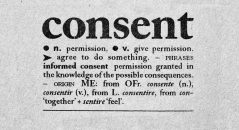Consensual Non-Consent (CNC) is a form of roleplay that involves pre-negotiated scenarios where one party pretends not to consent to sexual acts, despite full, informed agreement beforehand. While many adults engage in CNC as part of consensual BDSM relationships, the topic remains deeply controversial, especially in digital spaces.
This article explores why CNC content is often banned or restricted and why payment processors label it as “obscene” or non-compliant with their terms.
CNC falls under the broader umbrella of BDSM and is often described as a form of “rape play” where consent is given in advance but simulated non-consent is acted out. The key to understanding CNC is that true consent is essential and negotiated beforehand, with safe words, boundaries, and communication at its core.
Why Platforms and Payment Processors Restrict CNC Content
Despite its consensual nature among participants, CNC raises serious red flags for platforms and financial institutions for several reasons:
1. Legal Ambiguity
CNC blurs the line between consensual kink and non-consensual acts in the eyes of the law. In many jurisdictions, content that appears to depict sexual assault or coercion—even if staged—can be classified as obscene or illegal. Courts and law enforcement may not distinguish between fantasy and actual criminal behavior, especially when there’s no clear marker within the content that it’s a roleplay.
2. Obscenity Standards
Obscenity laws and community standards govern U.S.-based payment processors like Visa and Mastercard. The Miller Test, used to define obscenity in the U.S., looks at whether:
- The average person would find the material appeals to prurient interest,
- The work depicts sexual conduct in an offensive way,
- The work lacks serious literary, artistic, political, or scientific value.
CNC content, especially if graphic or realistic, often fails this test in the eyes of financial institutions, even if it’s intended for educational or artistic purposes.
Even though CNC is rooted in consensual roleplay, it often simulates non-consensual acts, sometimes violently and explicitly. This alone can push it into legally risky territory. Here’s how each part of the Miller Test applies:
Prurient Interest: CNC content is sexual in nature and often created to arouse. The fact that it simulates non-consent can make it appear, to outsiders, like it’s exploiting or glorifying sexual violence. This is especially true if the visual or narrative emphasis is on domination, resistance, or distress. To the “average person,” especially one outside BDSM circles, this content may seem to appeal to deviant sexual interests, thereby meeting this threshold.
Patently Offensive: Simulated rape or coercion, even when performed by consenting adults, can be seen as patently offensive sexual conduct under most state laws, particularly those that criminalize depictions of forced sex or degradation. If the scene includes physical struggle, crying, verbal resistance, or physical restraints without context, it may appear indistinguishable from actual sexual assault, making it particularly problematic.
Lack of Serious Value: Although many BDSM practitioners argue that CNC content can have artistic, psychological, or educational value, this is rarely how it’s interpreted by courts or regulators, especially when the material is purely erotic and lacks any framing, narrative, or disclaimers. Payment processors and platforms often err on the side of caution and assume zero artistic or social merit when evaluating such content, especially if it’s user-generated and not professionally produced.
The Payment Processor Angle
Visa, Mastercard, and other financial institutions rely on conservative interpretations of obscenity to minimize legal exposure and comply with banking regulations. Their content compliance teams often default to flagging or banning entire categories (like CNC or “rape play”) rather than evaluating each instance. Even if something may not be strictly illegal, the risk of legal ambiguity is enough to warrant prohibition.
This cautious stance was further cemented after the 2020 crackdown on Pornhub and other platforms where financial institutions pulled support over concerns about non-consensual content. Since then, payment processors have become extremely risk-averse, particularly toward anything that could be mistaken for non-consensual sex, regardless of consent or artistic framing.
3. Risk of Misuse and Misinterpretation
CNC scenarios, particularly if distributed without context, risk being misinterpreted as real abuse. This poses reputational and legal risks for hosting platforms and payment gateways, which could be seen as enabling or profiting from potentially abusive material.
4. Anti-Trafficking and Exploitation Policies
Major financial services and tech platforms have ramped up scrutiny to avoid facilitating trafficking or exploitation. CNC content, especially if not clearly labeled or involving ambiguous cues, can trigger automated moderation systems or human reviewers to flag it as potential abuse. Payment processors often adopt zero-tolerance policies to avoid liability.
Even when CNC content is legally protected as free expression or art, platforms and payment providers may still choose to disallow it to maintain public trust, brand safety, and advertiser confidence. Public backlash or media coverage around such content can severely damage a company’s image, even if no laws are broken.
Beyond legality and payment processor rules, many platforms and businesses prohibit CNC content due to broader ethical considerations and concerns about public perception.
Protecting Vulnerable Audiences
Even with content warnings and age restrictions, platforms have a responsibility to prevent exposure to potentially harmful material, especially to minors or trauma survivors. CNC, by nature, replicates scenarios of sexual assault, which can be triggering or retraumatizing to viewers, regardless of the context. Many platforms take a proactive stance, blocking this kind of material entirely rather than relying on users to self-filter.
Corporate Image and Brand Safety
Companies are acutely aware that hosting or facilitating payments for controversial content can damage their reputation. A single high-profile incident, such as a journalist or advocacy group highlighting CNC content, can spark public outcry and bring unwanted attention to a platform or brand. To avoid this, many tech companies and payment processors implement blanket bans on categories of content they deem high-risk, regardless of nuance or context.
For example, even if CNC content is fully consensual and produced by adults, companies may worry that the optics will align them with non-consensual violence, especially in an era where corporate responsibility and social values are scrutinized closely.
Censorship vs. Corporate Policy
Critics of such bans often argue that they amount to censorship of consensual adult expression. While that debate is ongoing, it’s important to recognize that private companies are not bound by the First Amendment in the same way governments are. They have the right to set content guidelines that reflect their risk tolerance, business strategy, or ethical framework. In practice, this means they may restrict CNC even if it’s legal, simply to avoid controversy or align with the values of their leadership, investors, or customer base.
Blowback from Advocacy Groups and Media
Anti-trafficking organizations, feminist advocacy groups, and child protection agencies often pressure companies to implement strict content moderation around sexual content, especially material that could be construed as normalizing violence. CNC is often a top target in such efforts, even when consensually portrayed, because it can be misused to justify or romanticize real-world abuse in the eyes of critics. Companies tend to err on the side of caution to avoid becoming targets of organized campaigns or exposés.
While CNC remains a valid and consensual kink for many, it exists in a legal and cultural gray area. Creators and educators must navigate a complex web of regulations, community guidelines, and financial gatekeepers. Until clearer legal definitions and more nuanced moderation systems are in place, CNC will likely remain banned or heavily restricted on mainstream platforms—and excluded by risk-averse payment processors.




